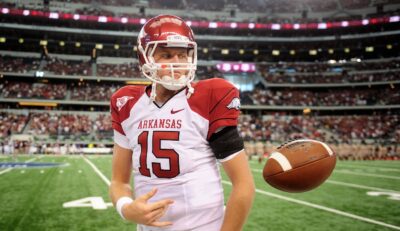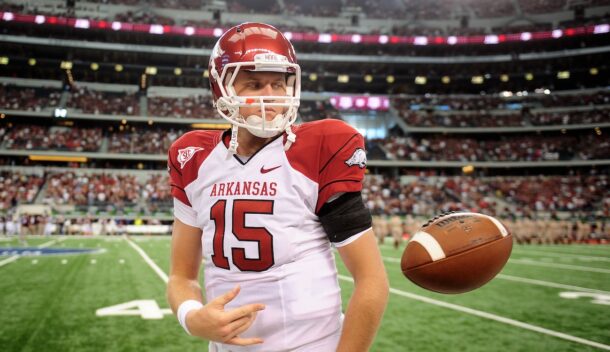Voting for individual awards is never an exact science, especially when the criteria for the award aren’t specific.
As is the case with the Final Four’s Most Outstanding Player.
There’s no requirement that the winner has to be the leading scorer on the championship team. In fact, he doesn’t have to be on the championship team. Nine winners have come from the team that lost the final game, and 3 others were rewarded for their play in a third-place consolation game that was discontinued in 1982.
Outstanding, Just Not Most Outstanding
The Most Outstanding Player of March Madness is selected by credentialed members of the media covering college basketball’s signature event. It’s a subjective pursuit that is open to different interpretations.
Most of the time, selecting the MOP is an easy choice. And most times the voters get it right. But not always.
Here are 5 instances in which the voters picked the wrong player. These players were snubbed and should have been named Most Outstanding Player:
Kris Jenkins, Villanova, 2016
Hitting the championship-winning shot, especially when it’s a dramatic buzzer-beater, doesn’t automatically qualify a player for Most Outstanding Player recognition. As we’ll soon see. But in the case of 2 players whose statistics are similar, such heroics can be a compelling tie-breaker.
Only it wasn’t for Jenkins.
His decisive basket marked the first time that the national title was decided by a 3-pointer as time expired. And he did it against top-seeded North Carolina. With Michael Jordan sitting courtside. But instead of Jenkins winning individual honors, the MOP trophy went to the teammate who passed him the ball for the decisive shot: Point guard Ryan Arcidiacono.
In his defense, Arcidiacono had nice stats – 16 points, 2 assists and 2 rebounds against the Tar Heels, preceded by a 15-point, 3-rebound, 3-assist performance against Oklahoma in the Final Four semifinal. But Jenkins’ lines were just as good. He had 14 points, 2 rebounds and 2 steals against UNC and 18 points, 8 rebounds and 2 steals against Oklahoma.
Almost identical. Except he made that clutch 3-pointer that brought down the confetti at the end.
Steve Alford, Indiana, 1987
The 1987 championship game between Indiana and Syracuse is best remembered for Keith Smart’s game-winning jumper with 3 seconds remaining. It’s a shot that was eerily similar to the one Michael Jordan hit against Georgetown on the same Superdome court 5 years earlier to win the title for North Carolina.
The biggest difference is that Smart was named the Most Outstanding Player of his tournament and Jordan was not.
Jordan’s omission was hardly a snub. Teammate James Worthy, who won the MOP award, was by far the better and more influential player throughout the Final Four. But the same can be said for Smart’s teammate Alford. The Hoosiers’ star outscored Smart 23-21 with 5 assists and 2 steals. But that’s not the only reason Alford should have been the MOP.
Indiana might never have been in a position for Smart to be the hero had it not been for Alford’s heroic 33-point performance in a 4-point semifinal win against UNLV. And Smart probably wouldn’t have had the ball in his hands in such a clutch situation had Syracuse not been paying such attention to defending Alford.
Gail Goodrich, UCLA, 1965
Granted, the award is for the outstanding player of the Final Four, not the most valuable. So it’s understandable why Princeton’s Bill Bradley – who also happened to be the highest-profile college player of the day – earned the award after going off for a March Madness-record 58 points against Wichita State.
But Bradley’s scoring outburst came in the now-defunct consolation game between the losers of the 2 Final Four semifinals. And over the final few minutes, Bradley’s teammates deliberately began feeding him in an attempt to break Oscar Robertson’s previous record of 56 points.
Meanwhile in the championship game, Goodrich pumped in 42 points to lead UCLA to a 91-80 win against Michigan for its second straight national championship. Goodrich was also the Bruins’ leading scorer with 28 points in their semifinal win against Wichita State while shooting better than 52% from the floor for the tournament.
Lennie Rosenbluth, North Carolina, 1957
Another case of name recognition winning out over actual impact on the championship took place in 1957. Wilt Chamberlain was an even bigger star than Bradley became, and while he did put up big numbers for Kansas, he was outshined by the lesser-known Rosenbluth.
North Carolina wasn’t the brand-name program it is now in 1957. Back then, it was an upstart school from the South best known for its New York-bred coach Frank McGuire. But Rosenbluth and the Tar Heels persevered, winning 2 straight triple-overtime games – including an epic final against Chamberlain’s Jayhawks – to finish their undefeated season at 32-0.
While name recognition doesn’t win championships, it does hold a lot of weight when it comes to individual awards. That’s why Chamberlain was named MOP, even though he and Rosenbluth and Chamberlain finished with virtually identical scoring totals: Rosenbluth had 51 in the 2 games (20 against Kansas and 31 against Michigan State in the semifinal); Chamberlain scored 55 (23 against UNC and 32 against San Francisco).
Bill Russell, San Francisco, 1956
The future Boston Celtics superstar won the MOP award for his dominant performance in leading the Dons to their first championship in 1955. He was just as good and maybe even more important to their second straight title in 1956 after teammate KC Jones was ruled ineligible for the postseason by the NCAA.
Russell scored 26 points and pulled down 27 rebounds in an 83-71 title-clinching victory against Iowa, 2 nights after going for 17 points and 23 rebounds in a semifinal rout of SMU. There’s no telling how many shots Russell blocked or assists he handed out – both of which were facets of his well-rounded game – since neither was an official stat and weren’t recorded.
But despite his outstanding performance, he was subbed in the voting for MOP in favor of Temple’s Hal Lear, who scored 48 points in a meaningless consolation game win against SMU.
Award-winning columnist Brett Friedlander has covered the ACC and college basketball since the 1980s.






